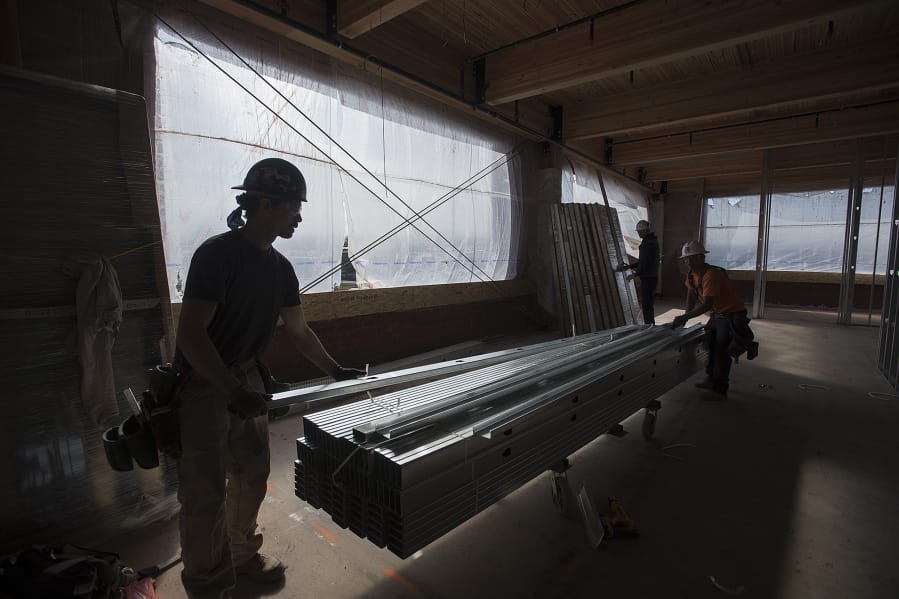Even when construction is strong, some real estate developers can’t help but tamp down expectations. It may well be to avoid flashbacks of the recession.
Hurley Development, for example, has secured more than $100 million in investments for new projects over the next two years, according to CEO Ryan Hurley. Its plans include a five-story office condo, two hotels, a commercial plaza near the Vancouver-Camas border and, in Orchards, a mixed-use center with 400 units.
“We’ve grown a lot in the last eight years,” Hurley said. Yet, despite the full plate, Hurley called the current state “terrifying and exciting at the same time.”
“A lot of people are depending on me to get this right,” he said. “In a pro-growth economy, our job is to keep checks and balances in play, not just with success but with the health of the community.”
Though the economy continues to be strong, prominent Vancouver builders are cautious about the near future. There are several ambitious projects in the works, even excluding The Waterfront Vancouver, but they are permeated by concerns over when — not if — the economy takes a downturn.
Killian Pacific is another cautiously optimistic company. It has succeeded on both sides of the Columbia River with such projects as The Hudson office building in downtown Vancouver and a three-block project that puts a Market of Choice, apartments and restaurants near Portland’s southeastern waterfront.
One of its big focal points in the near future is a 300,000-square-foot business park just east of the Grand Central shopping center. Called Convene, formerly Quad Industrial Park or Project Orange, the park could ultimately house 3,000 jobs, according to the firm’s own studies.
Since breaking ground last summer, the park’s anchor has risen quickly along state Highway 14. The three-story brick office building will house Home Depot QuoteCenter, a software enterprise that could house 200 workers by the end of the year.
The project exemplifies a lot of the firm’s ethos, said President Lance Killian, whose father George Killian founded the company. Careful designs and considerations will make for a good-looking business park that brings commerce — and parking — to a previously unused area just outside of the downtown core.
“If we create the most value for the community, the income side should take care of itself. And we can recycle that to do more in the community,” he said. “That’s the kind of virtuous cycle we like to create.”
Uncertainty
The cycle, however, is not always in their control. Developers are keeping close watch on the seesawing supply and demand of everything from office space, restaurants, housing and industrial land. Meanwhile, the costs of labor and building materials like wood and steel are on the rise.
“Construction costs increase at such a rapid rate, it’s hard to capture accurately in your pro forma,” said Hurley.
Hurley said the uncertainty is among the reasons why his projects dabble in all kinds of uses. Building across the board, sometimes combining them into large mixed-use developments, insulates his investments better than specializing in one type of product, he said.
“I know what my ratios are,” he said. “There’s always a downturn. There will be a cooling. It should be expected. When there’s an up, there’s a down.”
Neither Killian Pacific nor Hurley felt any upcoming recession would be as strong as The Great Recession, which sunk businesses in almost all sectors and saddled communities with empty buildings. However, both local firms stressed that they felt responsible to build very deliberately.
“I think if you look at certain indicators, you can already see telltale signs we’re starting to slow down,” said Adam Tyler, design and development manager for Killian Pacific. “The only question is, how slow does it get? How low does it go? I don’t think it will be anywhere near where we were in the last cycle, but we try to be very prudent and we try to do what’s in the best interest of the community, investors, stakeholders. Nobody wants to build a building that sits vacant.”
One barometer is the architecture industry. Architects are usually adding workers when development begins to rise, and are the first to let workers go when it sags. LSW Architects, a firm in downtown Vancouver, said it is faring well because it works with both private and public entities; but its private contracts are starting to wane somewhat.
“I think we’re really fortunate that we have a number of developers in Vancouver that make it a strong place to live and work,” Casey Wyckoff, principal, said. “I think, though, that particularly for private development, they are wanting to be smart about their investments. … Everyone wants to be able to protect themselves so that when the economy does turn down a bit that the developers are positioned to continue to grow through that slow-down rather than being reactive to it.”
Times are strong now, though. Mike Bomar, president of the Columbia River Economic Development Council said the pace of development lately has certainly been an asset for the community in convincing new companies to move here or convincing existing ones to stay.
“We like having options and developers who are proactive and willing to take on those kinds of investments,” he said. “That makes our job easier in plugging in those kinds of companies.”




